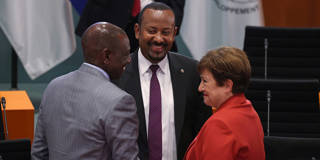The recent push to reform the global financial architecture creates an opportunity to build a more inclusive system that matches Africa’s aspirations, accelerates the green transition, and advances development objectives. Most importantly, such a system must provide equal access to reliable and affordable capital.
CAMBRIDGE – Last June, during French President Emmanuel Macron’s Summit for a New Global Financing Pact in Paris, Kenyan President William Ruto warned that the World Bank and the International Monetary Fund are “hostage” to the world’s wealthiest countries and unable to meet the development challenges facing the Global South. Echoing United Nations Secretary-General António Guterres’s call to reform the “morally bankrupt global financial system” that “perpetuates poverty and inequalities,” Ruto proposed creating a new multilateral institution that is fit for purpose and treats all member countries as equals.
More than any other region, Africa has borne the brunt of the dysfunction embedded in the world’s financial architecture. Despite decades of engagement with the Bretton Woods system, the continent suffers stubbornly high unemployment and poverty rates, even as living standards have improved elsewhere in the developing world.
The latest reform push for the Bretton Woods institutions creates an opportunity to build a more inclusive global financial system that matches Africa’s aspirations, accelerates the transition to a net-zero world, and advances development objectives more broadly. Such a transformation has become essential as the world economy contends with the mounting effects of climate change, and as major geopolitical shifts threaten to accelerate global fragmentation.

CAMBRIDGE – Last June, during French President Emmanuel Macron’s Summit for a New Global Financing Pact in Paris, Kenyan President William Ruto warned that the World Bank and the International Monetary Fund are “hostage” to the world’s wealthiest countries and unable to meet the development challenges facing the Global South. Echoing United Nations Secretary-General António Guterres’s call to reform the “morally bankrupt global financial system” that “perpetuates poverty and inequalities,” Ruto proposed creating a new multilateral institution that is fit for purpose and treats all member countries as equals.
More than any other region, Africa has borne the brunt of the dysfunction embedded in the world’s financial architecture. Despite decades of engagement with the Bretton Woods system, the continent suffers stubbornly high unemployment and poverty rates, even as living standards have improved elsewhere in the developing world.
The latest reform push for the Bretton Woods institutions creates an opportunity to build a more inclusive global financial system that matches Africa’s aspirations, accelerates the transition to a net-zero world, and advances development objectives more broadly. Such a transformation has become essential as the world economy contends with the mounting effects of climate change, and as major geopolitical shifts threaten to accelerate global fragmentation.